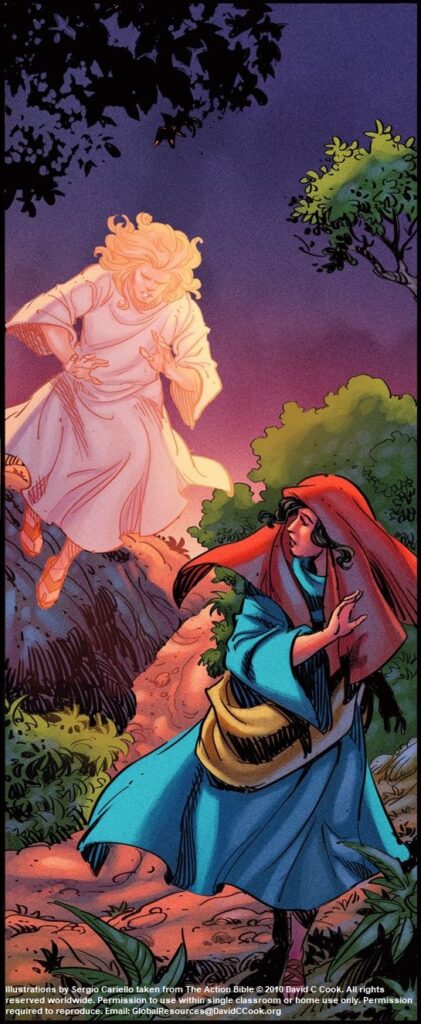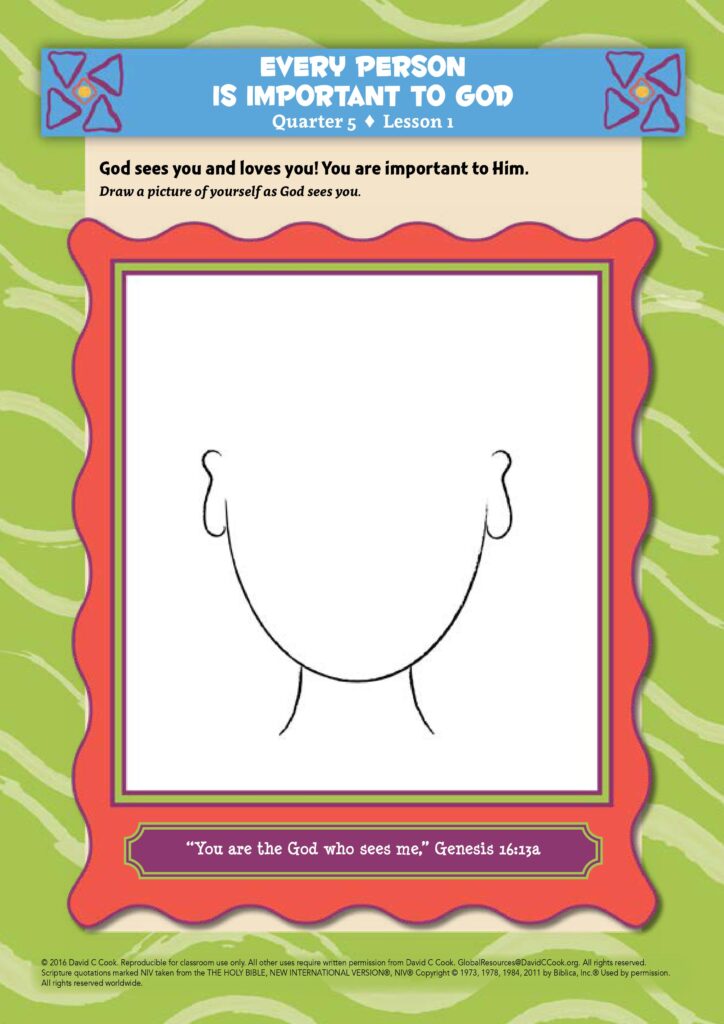During the lesson, the information for you to know is written in regular type, and what we suggest speaking or reading aloud to children is in bold. All resources for this lesson, including the Teacher Guide, Student Page, Family Connection Card, and other resources can be downloaded in a ZIP file by clicking on the following link:
In some lessons you will find "resource articles." These are articles written by experts from around the world to help equip you for your work with children and adolescents. Share them with parents or guardians if you consider it appropriate.
She gave this name to the Lord who spoke to her: “You are the God who sees me,” for she said, “I have now seen the One who sees me.”
Genesis 16:13
Hagar was a woman that few people noticed. She was a servant whose job in life was to obey her master. Other people considered her unimportant. But God does not see people as others see them. God noticed Hagar. He heard her misery, and He cared for her.
Today there are billions of people in the world. Whether you live in a crowded city or a rural village, it may be easy to feel invisible. You may feel that you are not important and the work you do is too small to matter. But the same God who saw Hagar notices you. You are important to Him!
Think about times when you knew God saw you. Maybe He provided for a physical need at just the right time. Maybe you felt discouraged and saw something that reminded you of His presence. This week look for God’s tender, individual touch in your life. Like Hagar, see the One who sees you, and give Him praise.
Tell families that this week you are teaching that God cares about every person, whether or not the world thinks she is important. Encourage families and children to list people considered important in their country and community. Then they can list people who God thinks are important. (Remind them that every person in their family is on the second list!)
Teacher Tip: If possible, email or text the Family Connection Card to the families of your students.
Greet each child by name if possible and ask each one to share the best part and worst part of her week. Gather the class together and choose an outgoing volunteer to stand at the front.
Explain that they will play a question game about important people. The volunteer will have to guess who he or she is by asking questions. Have the volunteer close his eyes and plug his ears with his fingers, or have him step outside for a few moments.
Quietly tell the class the name of a specific, important person whom they will all know. Some ideas:
The volunteer will come back or open his eyes and ears. He will ask questions that can be answered yes or no to figure out who he is. Examples of questions are “Am I a female?” “Am I famous?” “Am I alive?” “Do I have a beard?” The other children can answer the yes or no questions but cannot say anything else. If the volunteer gets stuck, you can offer little clues about the person to help him guess. Play the game again with a new volunteer if you have time. This activity should take about 10 minutes total.
Optional: Do the same activity described above but with the whole class participating. Before class, write the names of various important people that your children all know on slips of paper, 1 name per slip. Carefully tape or pin a slip to the back of each child’s clothes. The children will go around to others and show them the names on their backs. Then they can ask yes or no questions until they guess who they are. Once they guess correctly, they should sit down.
Encourage children to share their honest ideas. You do not need to correct them at this point in the lesson. You will address these ideas in more detail through the Bible story.
Today we will hear about a woman in the Bible who was a servant. To many people, she was not important. God, however, had a very different idea about this woman’s importance.
Many of the children have learned in previous lessons about how God guided Abram, also known as Abraham. Ask them to share what they remember about Abram before you tell the next part of the story. Affirm those who remember what they have learned.
Listen as I tell you about someone who was very important to God. Abram and Sarai wanted a son. They were getting old, and God had promised they would have a vast number of descendants. How could that be if they did not have even one child? For many years they waited and waited for a son. Abram was wealthy and well-known. Yet he still had no son.
Sarai felt awful about not having any children, and she was growing old. She knew God had promised to give her husband many descendants. It seemed like the promise would not come true because they were getting so old. So she made her own plan rather than waiting for God’s.
Turn to your neighbour and, using only one sentence, tell her what you think will happen next.
Ask 1–2 children to share their predictions.
Sarai had a servant named Hagar. In their culture, when a woman could not have a child, her husband would sometimes have a baby with a servant. The child would belong to the husband and his wife, not to the servant. Sarai thought that perhaps Hagar could provide the son that she could not give Abram.
Abram agreed with Sarai’s plan, and Hagar became pregnant. Everyone should have been happy, right? No, of course not. This plan did not honour marriage or God. The love between a husband and wife belongs to those people alone. Sarai was Abram’s wife, but now Hagar was going to have Abram’s baby.
Even though Hagar was going to have Abram’s baby, she was still Sarai’s servant. Hagar began to despise Sarai. As Hagar’s belly grew, so did her contempt for Sarai. Sarai had no idea that going outside of God’s plan could cause so much pain.
Turn to your neighbour and, using only one sentence, tell him what you think will happen next.
Ask 1–2 children to share their predictions.
Instead of correcting Hagar, Sarai turned all of her pain and rage against her. She began to mistreat Hagar. Finally, Hagar could not bear it any longer. She ran away.
This was a very dangerous thing for her to do. It is not safe to wander alone in a desert. She probably had very little food and no shelter. She may not have known where she was going. But Hagar may have thought that anything would be better than living with Sarai’s cruelty.
Hagar was alone, in the middle of the desert, and was going to have a baby. As she trekked on, she came to a spring of water. As she sat there, weak and weary, something amazing happened. The angel of the Lord came and spoke to her. This was amazing! God came to a servant woman, someone who other people did not see as important. But to God, she was very important.
If possible, show The Action Bible images as you tell the story.

Using only one sentence, tell your neighbour what you think the angel said to Hagar.
Ask 1–2 children to share their ideas.
The angel said, “Hagar, servant of Sarai, where have you come from, and where are you going?”
“I am running away from my mistress Sarai,” she answered.
Using only one sentence, tell your neighbour what you think the angel will tell her to do.
Ask 1–2 children to share their ideas.
Then the angel of the Lord told her, “Go back to your mistress and continue to be her faithful servant.” The angel added, “I will give you so many descendants that they will be too numerous to count.”
If possible, show The Action Bible images as you tell the story.

God’s promise to Hagar was a lot like His promise to Abram, wasn’t it? She was going to have many, many descendants. But these were not the children of God’s covenant with Abram. Remember, a covenant is a promise. God’s promise to Abram would come true through Sarai. The angel of the Lord went on to explain that Hagar would have a son who would be like a wild donkey, passionate for freedom and ready for battle. He also told her to name her son Ishmael.
Hagar was amazed that the angel of the Lord had come to her, a lowly servant woman. Let’s read a verse from the Bible that describes Hagar’s amazement.
Read Genesis 16:13 from your Bible.
Show the Memory Verse poster if you are using it.
She gave this name to the Lord who spoke to her: “You are the God who sees me,” for she said, “I have now seen the One who sees me.”
Genesis 16:13

Hagar was amazed that the Lord noticed her. She really mattered to the Most High God! The God who made the whole world saw her and took care of her, even in her loneliness and disgrace. She returned to Abram and Sarai and gave birth to a baby boy, who Abram named Ishmael, just as the angel had said.
God cares for those people the world thinks are important, and He cares for those people the world thinks are unimportant. God created every person in His image, and every person is special to Him.
Someday some of you may be doctors. You may be taxi drivers, mothers, or fathers. You may be country leaders, pastors, farmers, or many other things. Someday the world might think you are important, or it may think you are not important at all. But here is something exciting to remember: you will be important to God in the future no matter what other people think of you, and you are important to God right now!
Hagar was a servant. A lot of people might say she was not important. But God would never say that. He cared enough about Hagar to come to her in the desert. He cared enough to make special promises to her. He cared enough to tell her what she should name her baby and what kind of man he would become. She was very, very important to God. Just like you are!
Have you ever felt invisible or like no one else sees or notices you? Maybe you fell down on a crowded street and no one offered to help you up. Maybe you were sad and started crying in school and no one asked what was wrong. That is how Hagar must have felt when Sarai mistreated her. But Hagar was not invisible to God, and neither are you. God sees you. He knows who you are. He notices your feelings and your needs. God loves you.
I will read Hagar’s words from Genesis 16:13 again:
She gave this name to the Lord who spoke to her: “You are the God who sees me,” for she said, “I have now seen the One who sees me.”
Genesis 16:13
Explain that you will point to different children. When you point to someone, he will stand up and say, “God sees me, and I am a very important person to Him.” Take time to point to everyone. If you have a large group, point to 2 children at once and have them say the line together.
Optional Supplies: Have children form a circle and sit down. Explain that God sees them even more clearly than they can see themselves in a mirror. He notices every detail about them. He cares about every part of their lives. God loves them!
Pass the mirror around the circle and have each child look at her own reflection. As each child looks at her reflection, have her say out loud: “God sees me, and I am a very important person to Him.”
Optional: If you are using Student Pages, there is space for the children to draw themselves as God sees them.

There are other people in your life who may also feel invisible. They may feel that nobody notices them or cares about them. God can use you to help other people know that God notices them and that they are important to Him.
I will read a few short stories. In each one, someone does not feel important. After I read the story, share with your neighbour what you could do to help this person know that she is important to God.
End class by praying this blessing over the children based on Genesis 16:13:
Blessing: God is the One who sees you. He notices when you are happy and when you are sad. May you always know that you are important to Him!
Lead the students in singing this quarter’s song, if possible.
Life on Life ©2020 David C Cook. Reproducible for home or classroom use only. All other uses require written permission from David C Cook [email protected]. All rights reserved.